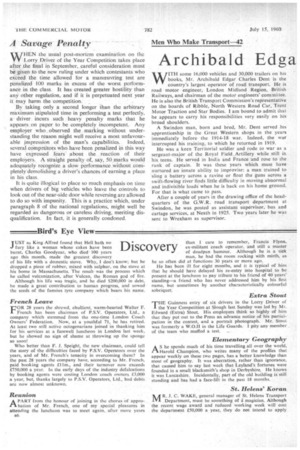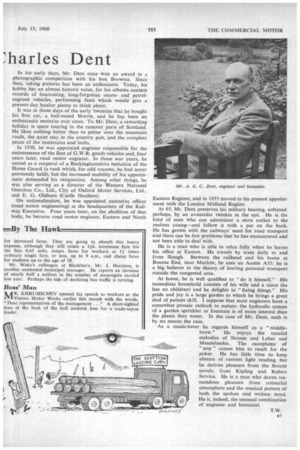Men Who Make Transport-42
Page 40

Page 41

If you've noticed an error in this article please click here to report it so we can fix it.
Archibald Edga
1,harles Dent WITH some 16,000 vehicles and 30,000 trailer's on his books, Mr. Archibald Edgar Charles Dent is the country's largest operator of road transport. He is road motor engineer, London Midland Region, British Railways, and chairman of the motor engineers' committee. He is also the British Transport Commission's representative on the boards of Ribble, North Western Road Car, Trent Motor Traction and Star Bodies. I am bound to admit that he appears to carry his responsibilities very easily on his broad shoulders.
A Swindon man, born and bred, Mr. Dent served his apprenticeship in the Great Western shops in the years immediately before the 1914-18 war. Indeed, the war interrupted his training, to which he returned in 1919.
He was a keen Territorial soldier and rode to war as a sergeant-major of the Royal Field Artillery while still in his teens. He served in India and France -and rose to the rank of captain. It was these years which must have nurtured an innate ability to improvise: a man trained to sling a battery across a ravine or float the guns across a swift-flowing river finds little difficulty in moving abnormal and indivisible loads when he is back on his home ground. For that is what came to pass.
After a couple of years in the drawing office of the headquarters of the G.W.R. road transport department at Swindon, he was posted as assistant supervisor, bus and cartage services, at Neath in 1925. Two years later he was sent to Wrexham as supervisor. In his early days, Mr. Dent once won an award in a photographic competition with his box Brownie. Since then, taking pictures has been an enthusiasm. Today, his hobby has an almost historic value, for his albums contain records of fascinating, long-forgotten steamand petrolengined vehicles, performing feats which would give a present-day haulier plenty to think about.
It was in those days of the early 'twenties that he bought his first car, a bull-nosed Morris, and he has been an enthusiastic motorist ever since. To Mr. Dent, a rewarding holiday is spent touring in the remoter parts of Scotland. He likes nothing better than to potter over the mountain roads, the quiet stay in the country pub, and the complete peace of the mountains and lochs.
In 1938, he was appointed engineer responsible for the maintenance of the fleet of G.W.R. goods vehicles and, four years later, road motor engineer. In those war years, he served as a corporal of a Buckinghamshire battalion of the Home Guard (a rank which, for odd reasons, he had never previously held), but the increased mobility of his appointment demanded his resignation. Among other things, he was also serving as a director of the Western National Omnibus Co., Ltd., City of Oxford Motor Services, Ltd., and E. G. Oldham (Cattle Hauliers).
On nationalization, he was appointed executive officer (road motor engineering) at the headquarters of the Railway Executive. Four years later, on the abolition of that body, he became road motor engineer, Eastern and North
Eastern Regions, and in 1955 moved to his present appointment with the London Midland Region.
At 65, Mr. Dent preserves his military bearing, softened perhaps, by an avuncular twinkle in the eye. He is the kind of man who can administer a stern rocket to the zealous young—and follow it with a pat on the back. He has grown with the railways' need for road transport and there can be few problems that he has encountered and not been able to deal with.
He is a man who is able to relax fully when he leaves his office at Euston. He travels by train daily to and from Slough. Between the railhead and his home at Bourne End, near Marlow, he uses an Austin A55: he is a big believer in the theory of leaving personal transport outside the congested area.
At home, he is well qualified to "do it himself." His immediate household consists of his wife and a niece (he has no children) and he delights in "fixing things." His pride and joy is a large garden to which he brings a great deal of patient skill. I suppose that most engineers have a somewhat prosaic outlook to nature: the hydraulic system of a garden sprinkler or fountain is of more interest than the plants they water. In the case of Mr. Dent, such is by no means the case.
As a music-lover he regards himself as a "middlebrow." He enjoys the tuneful melodies of Strauss and Lehar and Mendelssohn. The cacophony of • " pop " causes him to reach for the poker. He has little time to keep abreast of current light reading, but he derives pleasure from the Brontë novels, from Kipling and Robert Service. He is a man who draws tremendous pleasure from colourful atmosphere and the musical pattern of both the spoken and written word. He is, indeed, the unusual combination of engineer and humanist.




















































































































